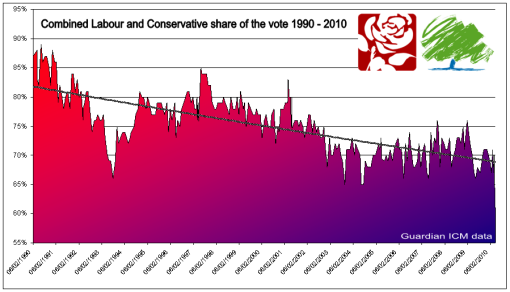… in the percentage of the vote going to the two big parties.

The TV debates aren’t responsible for the Hung Parliament that will follow Thursday’s election as surely as night follows day. A quarter of a century of decline in the combined Labour and Conservative share of the vote means that the two party stranglehold over UK politics is on its way out and Clegg’s TV performance was just a tipping point.
One of the wonderful things about the web is the accessibility of data. The Guardian has published all of the Guardian/ICM polling data since 1984. At Election 10 we took the combined Labour and Conservative share for every poll and created the graph above. In 1990 the two parties were claiming almost 90% of the vote between them this has shrunk to a little over 60% and it has been a steady consistent decline. A continuation of this would mean a government taking power that was opposed by around 65% of the population. Even our bizarre electoral system can’t sustain this.
Hmmm… I’m not sure about that optimistic conclusion. The British system can support a good many constitutional absurdities. But isn’t it interesting what a good long run of data can show, eh?
[Source.]
